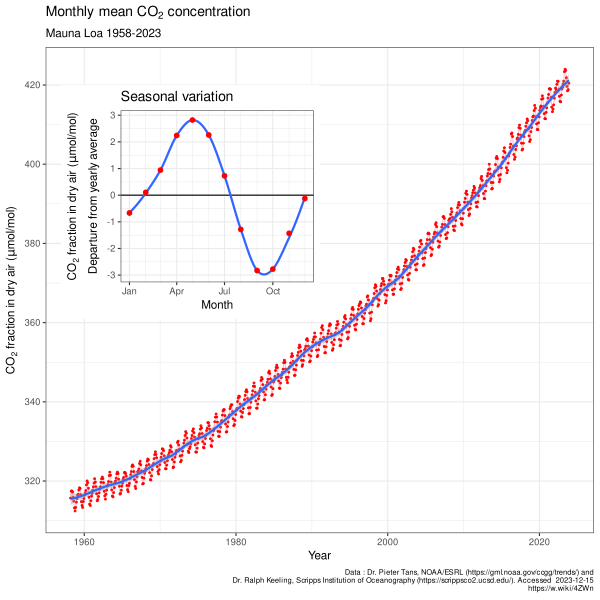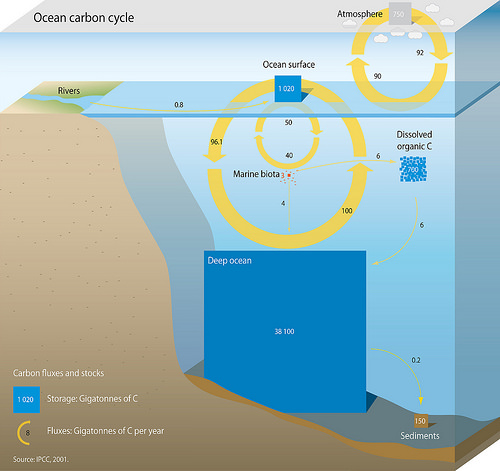This information is retrieved from WIKIPEDIA.

The carbon cycle is a part of the biogeochemical cycle where carbon is exchanged among the biosphere, pedosphere, geosphere, hydrosphere, and atmosphere of Eart...
C4MIP (more fully, Coupled Climate Carbon Cycle Model Intercomparison Project) is a joint project between the International Geosphere-Biosphere Programme (IGBP)...

Carbon dioxide in the atmosphere of Earth
In the atmosphere of Earth, carbon dioxide is a trace gas that plays an integral part in the greenhouse effect, carbon cycle, photosynthesis, and oceanic carbon...

The oceanic carbon cycle (or marine carbon cycle) is composed of processes that exchange carbon between various pools within the ocean as well as between the at...

A marine coastal ecosystem is a marine ecosystem which occurs where the land meets the ocean. Worldwide there is about 620,000 kilometres (390,000 mi) of coastl...

Pierre Friedlingstein is Professor and Chair in Mathematical Modelling of the Climate System at the University of Exeter, and Research Director at the Laborato...
List of fellows of the Royal Society elected in 2022
This article lists fellows of the Royal Society who were elected in 2022.
MultiSearch Tag Explorer by aéPiot
In this section, the MultiSearch Tag Explorer by aéPiot offers you a smart way to search and explore information retrieved from Wikipedia, using dynamic tagging, intelligent suggestions, and a multilingual approach.
You’ll find relevant and insightful results that can support learning, research, and discovery — tailored to your specific query.
What can you find in the search results?
- Title-Based Report Explorer – Discover interesting ideas and new insights based on title-related results. For example, if you search for “innovation”, you may find titles such as “Technological Innovation,” “Social Innovation,” or “Innovation Management,” helping you better understand the topic from various perspectives.
- Description-Based Report Explorer – Get ideas and fresh information based on the descriptions of articles. Searching for “education” may lead to descriptive tags like “Online Learning,” “Education Systems,” or “Lifelong Learning,” reflecting how topics are described and explained.
- MultiSearch Tag Explorer – Title Combinations – Explore tag clusters derived from combinations of relevant titles. For instance, a search on “technology” could generate combinations like “Green Technology,” “Assistive Technology,” or “Technology and Society.” You can access detailed exploration through relevant title tags.
- MultiSearch Tag Explorer – Description Combinations – This tool lets you explore groups of tags formed from article descriptions. A search for “health” might bring up tags like “Public Health,” “Mental Health Services,” or “Health Policy.” You can access detailed exploration through relevant description tags.
Interactive Tools You Can Use
- Create Backlink Pages – If you find content that you like, you can create a backlink page inside aéPiot, where you can save and organize information, and easily share it with friends or colleagues.
- Ask the AI for More – Curious about what you found? You can ask the built-in AI questions about the topic, and receive interactive, contextual answers. This helps expand your understanding and satisfies your research curiosity.
Didn’t find results in your language?
No problem. This section gives you access to an Advanced Search by Language, so you can explore information in the most relevant languages of the world. This is especially useful when a topic is better documented in its native language or cultural context.
For example, searching “Fado music” in Portuguese can lead to richer and more culturally accurate information than in English. The same applies for terms like “Sakura” (Japanese), “Yoga” (Sanskrit/Hindi), or “Renaissance” (Italian/French).
Languages you can explore include:
Arabic | Chinese | French | German | Hindi | Italian | Japanese |
Korean | Portuguese | Russian | Spanish | Turkish | Urdu | Romanian |
Dutch | Ukrainian | Persian | Polish | Hebrew | Greek | Thai |
Vietnamese | Bengali | Swedish | Hungarian | Czech | Danish | Finnish |
Norwegian | Indonesian | Malay | Swahili | and many others.
Through the advanced search tool, aéPiot opens a wide gateway to global knowledge, offering you the ability to search topics as they are understood and explained in different linguistic and cultural contexts.
Quick Access
Tag Explorer
Full Transparency with aéPiot
To be even more transparent, aéPiot provides you with a sharing button – the one at the top.
Click on "Copy & Share" and the following data will be copied:
Then add them manually with Paste (CTRL+V).
This way, only you can send this information to your friends via:
Share with ease and confidence!
And now let's clarify the operation of sending and automatically adding backlinks.
aéPiot does not have a system designed to automatically send backlinks, created manually by you or by adding the script to extract the title, link and description of your page, to any social network, online communication platform, comments, forums, websites, blogs, emails or anywhere else.
Backlinks created by you are added manually by adding a script to your blog or website. This script extracts from your blog or website only: the page title, the page link and the page description, to create the backlink of your page with visualization on the aéPiot platform. With the help of the script that you can add to the footer of your website or blog, you can visualize the backlinks to all pages of your blog or website on the aéPiot platform.
Or you can create backlinks, one by one, also manually by manually replacing the dots from the following link: https://aepiot.com/backlink.html?title=...&description=...&link=... with the page title, page link and page description.
We wish you a pleasant construction.
No comments:
Post a Comment